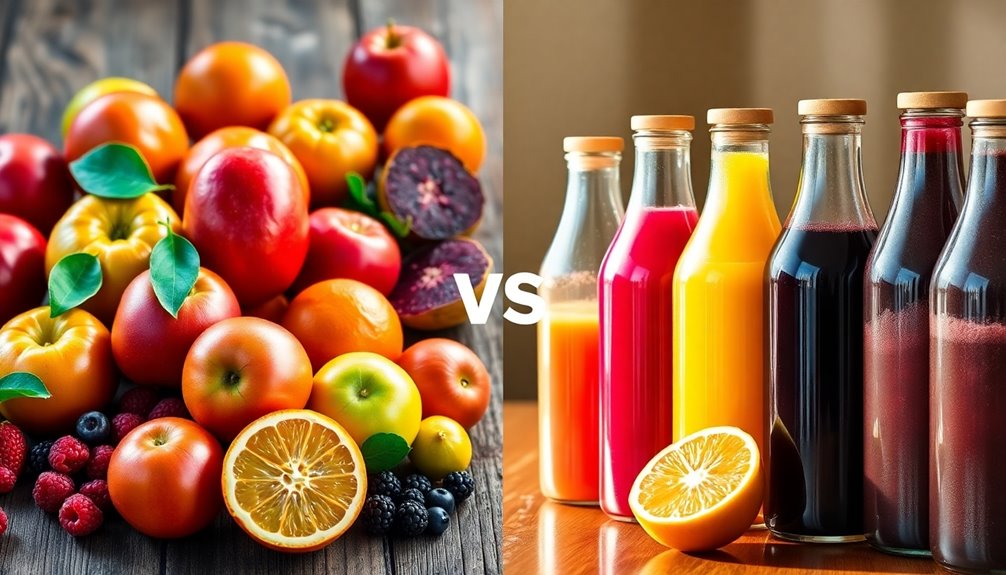When you compare whole fruits to juices, whole fruits clearly win the nutritional showdown. They're packed with fiber, vitamins, and minerals that support your health, while juices often contain high sugar levels without the beneficial fiber. This means whole fruits help regulate blood sugar and keep you feeling fuller longer. Plus, they promote better digestive health and lower the risk of chronic diseases. Stick around to discover practical ways to incorporate more whole fruits into your diet!
Key Takeaways
- Whole fruits provide dietary fiber, promoting digestive health and preventing constipation, unlike juices which lack this essential nutrient.
- Whole fruits release sugar gradually, aiding in better blood sugar regulation and reducing the risk of type 2 diabetes.
- Juices often contain high sugar levels and can cause rapid spikes in blood sugar, leading to potential insulin resistance.
- Whole fruits are nutrient-dense, retaining more vitamins, minerals, and antioxidants compared to processed juices.
- Higher fiber content in whole fruits enhances satiety, facilitating weight management and reducing overall caloric intake.
Nutritional Content: Whole Fruits vs. Juices
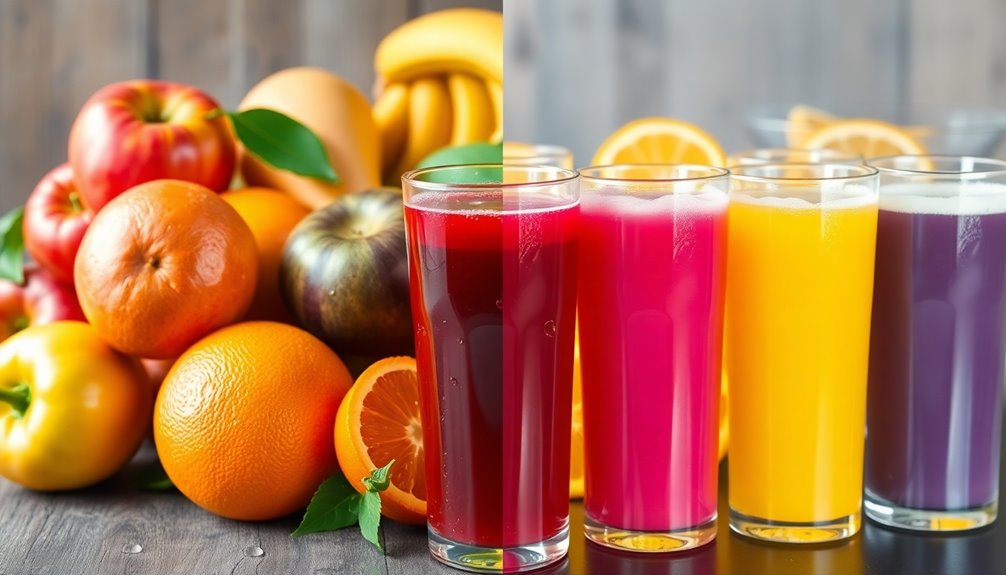
When you compare the nutritional content of whole fruits and juices, it becomes clear that whole fruits offer more benefits for your health. Whole fruits are rich in fiber, which aids digestion and helps maintain stable blood sugar levels, whereas juices often lack this essential nutrient due to the extraction process. In a juice vs. whole fruits comparison, you’ll also find that whole fruits contain various vitamins, minerals, and phytonutrients that are often diminished in juice. Additionally, the natural sugars found in whole fruits are balanced by their fiber content, making them a healthier choice for satisfying your sweet tooth without spiking your blood sugar.
Whole fruits are rich in dietary fiber, which is mostly missing in juices. While juices can pack 15 to 30 grams of sugar in just six ounces, whole fruits provide complex carbohydrates that help stabilize blood sugar levels. Additionally, whole fruit consumption has been shown to affect DNA chemical signatures differently than juice consumption. The soluble fiber in whole fruits can promote bowel regularity, further enhancing digestive health.
Whole fruits also retain more vitamins, minerals, and beneficial phytochemicals, especially in their skin and pulp. Moreover, they've a higher water content, making you feel fuller with fewer calories.
Juices may seem convenient, but consuming whole fruits leads to better satiety, nutrient absorption, and overall health benefits. Choosing whole fruits is a smarter, more nutritious option.
Health Benefits of Whole Fruits
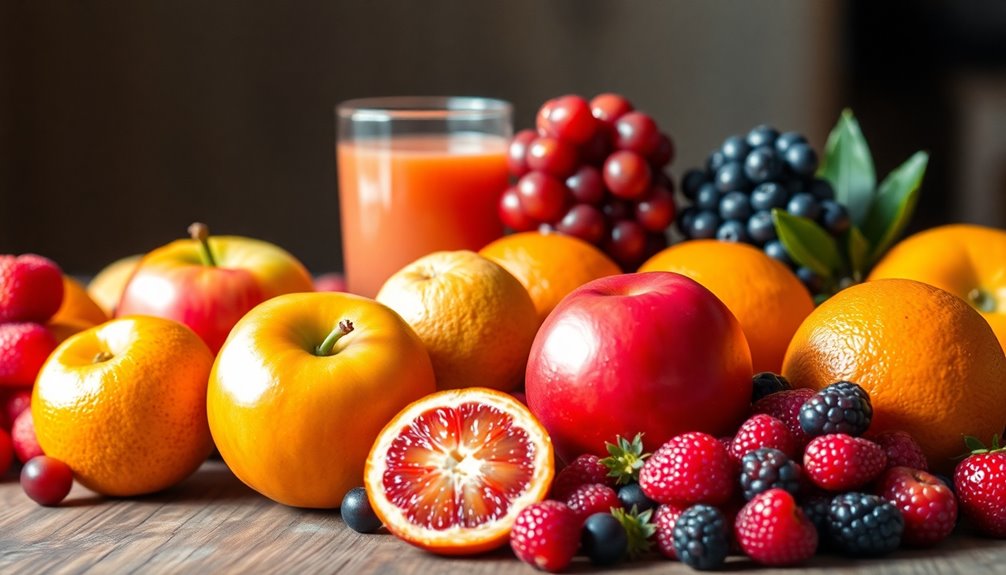
Whole fruits offer a multitude of health benefits that can significantly enhance your overall well-being. They promote gastrointestinal health, helping to prevent constipation and inflammatory bowel diseases. Additionally, increased fibre intake from whole fruits is linked to reduced risk of coronary events, further supporting heart health. Whole fruits are also high in vitamins A, C, and K, which are essential for immune health and overall wellness.
Eating whole fruits can reduce your risk of cardiovascular disease and metabolic syndrome, while also defending against certain cancers, like colorectal and lung cancers. You'll find that incorporating fruits into your diet boosts your psychological well-being, potentially lowering your risk of depression.
Additionally, whole fruits contribute to better bone health and may aid in weight management, supporting your long-term health goals. With their rich fiber content, whole fruits also enhance nutrient absorption and support beneficial gut bacteria, making them a vital choice for a healthier lifestyle.
The Impact on Blood Sugar and Insulin Response
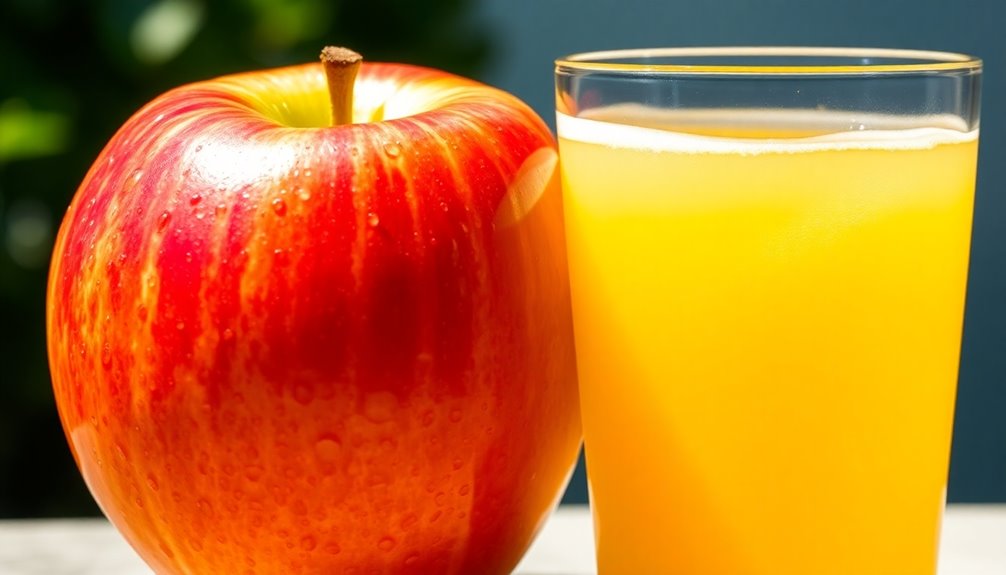
The way you consume fruits can significantly affect your blood sugar and insulin response. Whole fruits release sugar more gradually, allowing for better blood sugar regulation. In contrast, fruit juices can cause rapid spikes in blood sugar due to their lack of fiber, which normally slows sugar absorption. This rapid absorption can lead to increased calorie intake and potential metabolic issues over time. Whole fruits generally trigger a lower insulin response, helping prevent insulin resistance, while fruit juices may contribute to higher insulin peaks. Regularly consuming juices can exacerbate these spikes, increasing the risk of type 2 diabetes. For better glycemic control and metabolic health, stick to whole fruits and savor their benefits without the sugar rush. Whole fruits promote greater satiety compared to juices, making them a more satisfying choice. Additionally, juice cleanses can lead to nutrient deficiencies if used for extended periods, further complicating blood sugar management.
Weight Management: The Role of Fiber
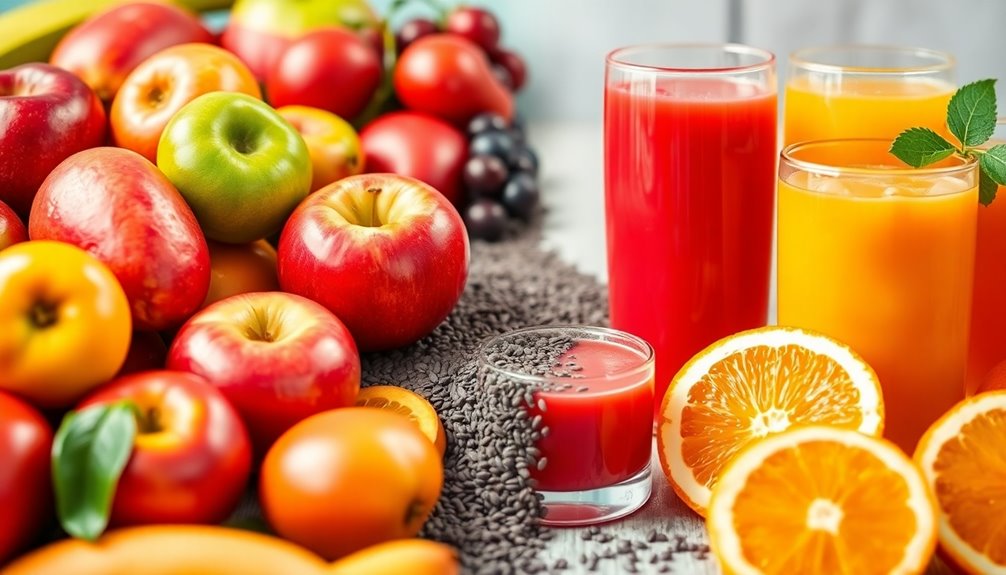
While many people focus on calories when managing weight, fiber plays a crucial role that shouldn't be overlooked.
Whole fruits pack more fiber than juices, helping you feel full and satisfied. This satiety effect can reduce your overall caloric intake, making it easier to manage your weight. Fiber stimulates receptors in the stomach that signal the brain to stop eating, further aiding in appetite control. Additionally, juices such as beet juice can improve blood flow, which may also influence metabolism and energy levels, supporting weight management efforts.
Studies show that higher fiber intake from whole fruits can lead to significant weight loss over time. Both soluble and insoluble fibers contribute to feelings of fullness and help regulate hunger hormones.
To reap these benefits, aim for the American Heart Association's recommendation of 25-30 grams of fiber daily.
Nutrient Absorption: Juices vs. Whole Fruits
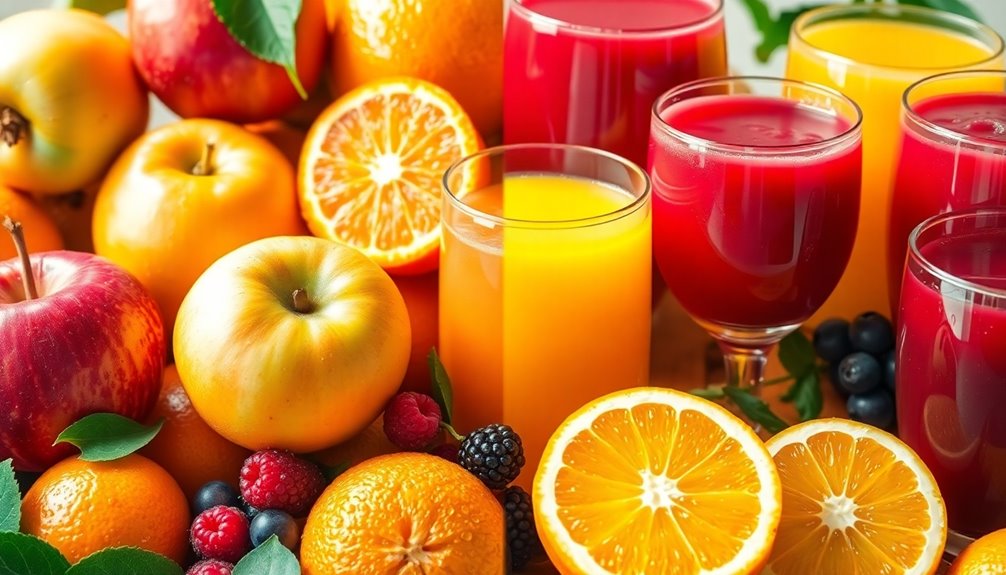
Nutrient Absorption: Juices vs. Whole Fruits
When considering nutrient absorption, it's crucial to recognize how whole fruits and juices differ. Whole fruits pack more dietary fiber, which aids in nutrient absorption and slows digestion, leading to steadier blood sugar levels. This slower sugar absorption helps reduce spikes, making whole fruits a better option for blood sugar regulation. Additionally, whole fruits retain more vitamins, minerals, and phytonutrients, offering greater antioxidant density than juices. They also support satiety, helping you control your appetite. Moreover, the fiber in whole fruits influences gene expression, positively impacting health outcomes. In contrast, juices often lose beneficial nutrients during processing, making whole fruits the superior choice for optimal nutrient absorption and overall health. Fresh fruit and vegetable juices may have hidden side effects, making it essential to consider whole fruits as a healthier alternative. Furthermore, including chia seeds in your diet can enhance the benefits of whole fruits by increasing fiber intake and promoting feelings of fullness.
Practical Tips for Incorporating Whole Fruits Into Your Diet
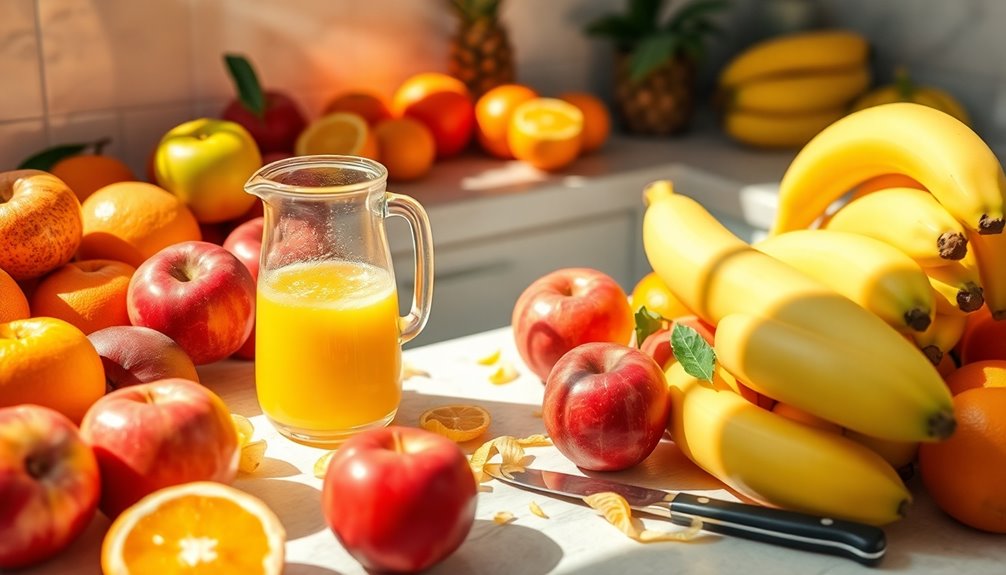
Incorporating whole fruits into your diet can be both enjoyable and beneficial for your overall health. Start your day by topping whole-grain cereal or pancakes with seasonal fruits like bananas or apples. For a sweet oatmeal, mix in raisins or chopped peaches. Freshly squeezed juice retains more nutrients than processed juice which makes whole fruits a superior choice.
When snacking, prepare fruit kabobs with melon, or keep easy-to-grab fruits like grapes and oranges handy. You can create a delightful trail mix by combining dried fruits and nuts. Additionally, daily goals suggest aiming for 2 cups of fruit to maximize your nutrient intake.
At mealtime, add fruits to salads or make a fresh fruit salsa to enhance your dishes. Don't forget to keep cut-up fruits visible in your fridge, pack portable options for on-the-go, or whip up smoothies to make healthy eating convenient and delicious!
Frequently Asked Questions
Can I Drink Fruit Juice While on a Diet?
Yes, you can drink fruit juice while on a diet, but moderation is key.
Juices often have higher sugar levels and lack fiber, which can lead to quicker absorption and increased hunger.
To maintain balance, consider pairing juice with whole fruits or other nutrient-rich foods. This way, you get the benefits of both while minimizing potential downsides.
Always plan your meals carefully to avoid nutrient imbalances and ensure you're meeting your dietary goals.
Are Smoothies Better Than Fruit Juice?
When comparing smoothies and fruit juice, smoothies often come out on top.
You'll find they contain more fiber, which aids digestion and keeps you feeling full longer.
Smoothies also retain more nutrients from the whole fruits and veggies, making them a healthier choice.
While both can be high in sugar, smoothies generally offer better overall health benefits, supporting weight management and heart health more effectively than juices.
How Much Fruit Should I Eat Daily?
Imagine your body as a flourishing garden, craving the nourishment of fruits to bloom. You should aim for at least two servings of fruit daily, ideally 1½ to 2 cups, depending on your age.
Each bite not only satisfies but also shields you from diseases and enriches your health. Embrace a colorful variety to ensure you're reaping all the benefits, and let your garden thrive with every delicious piece you consume.
Does Cooking Affect the Nutritional Content of Fruits?
Yes, cooking does affect the nutritional content of fruits. When you cook fruits, you can lose vitamins, especially vitamin C, due to heat.
However, minerals and fiber tend to remain stable. Methods like steaming are better for preserving nutrients than boiling.
You'll find that cooked fruits can be easier to digest and taste sweeter, but raw fruits generally offer more fiber and vitamins.
Are Dried Fruits as Healthy as Fresh Fruits?
Dried fruits can be healthy, but they're not always as nutritious as fresh fruits.
While dried fruits pack more fiber and minerals, they also contain concentrated sugars and fewer vitamins, like vitamin C.
Fresh fruits provide hydration and lower calorie options, making them better for weight management.
If you include both in your diet, you'll enjoy a variety of nutrients.
Just watch for added sugars in dried varieties to keep it balanced.
Conclusion
In the battle of whole fruits versus juices, it's clear that whole fruits come out on top. Did you know that eating just one apple can provide you with about 4 grams of fiber, helping you feel full for longer? This fiber not only aids digestion but also keeps your blood sugar steady. So, next time you reach for a drink, consider grabbing a fresh piece of fruit instead. Your body will thank you for it!
Cindy thoroughly researches juicing trends, techniques, and recipes to provide readers with practical advice and inspiration. Her writing style is accessible, engaging, and designed to make complex concepts easy to understand. Cindy’s dedication to promoting the advantages of juicing shines through her work, empowering readers to make positive changes in their lives through the simple act of juicing.

